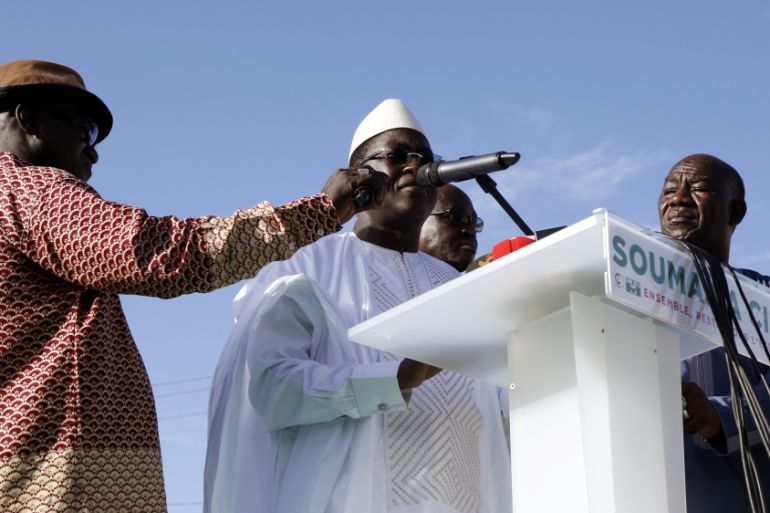Mali: Abducted Soumaila Cisse ‘doing well’, release talks on
Negotiations with kidnappers of leading opposition leader ‘continue normally’, his party says.

Leading Malian opposition leader Soumaila Cisse is “doing well” more than a week since his abduction, his political party has said, as negotiations with his captors continue for his release.
On March 25, the 70-year-old and members of his team were kidnapped while campaigning in volatile central Mali days before the country’s long-delayed parliamentary election.
Keep reading
list of 3 itemsCoronavirus: Which countries have confirmed cases?
The Sahel: Key things to know as security crisis spirals
Five people kidnapped along with Cisse by unidentified gunmen were freed on Thursday and are doing well, his Union for the Republic and Democracy (URD) party said.
Cisse and three other members of his delegation still detained “are also doing well”, Demba Traore, URD spokesman, told reporters on Friday.
“I can assure you that no ransom was paid,” Traore said. “Negotiations are continuing normally.”
The talks are being led by a local mayor and some community figures.
|
|
Fighters with links to al-Qaeda and ISIL (ISIS) launch frequent attacks on civilian and military targets in that part of the country.
The Malian government welcomed the liberation of the five, saying it was a good signal for the eventual release of Cisse, a former minister of finance who has run for president three times.
The opposition leader won his seat in the parliamentary election on Sunday, provisional results released on Thursday indicated.
Despite a years-long conflict raging in the country, Cisse’s abduction was the first of a politician of his rank.
Mali has been struggling to contain an armed rebellion that erupted in the north in 2012, and which has claimed thousands of military and civilian lives.
The country has been plagued by conflict since 2012, when rebels captured much of the country’s arid north.
Armed groups overtook the rebels in the north and swept into the country’s centre, accelerating a conflict which has killed thousands of soldiers and civilians.
More than six years after French forces intervened in 2013 to halt the fighters’ advance from Mali’s desert north, the violence has spread across the Sahel, an arid region between the Sahara desert and Africa’s savannas, to neighbouring Burkina Faso and Niger.
According to the United Nations, attacks have increased fivefold in the three countries since 2016 with more than 4,000 deaths reported in 2019 compared with an estimated 770 deaths three years before.